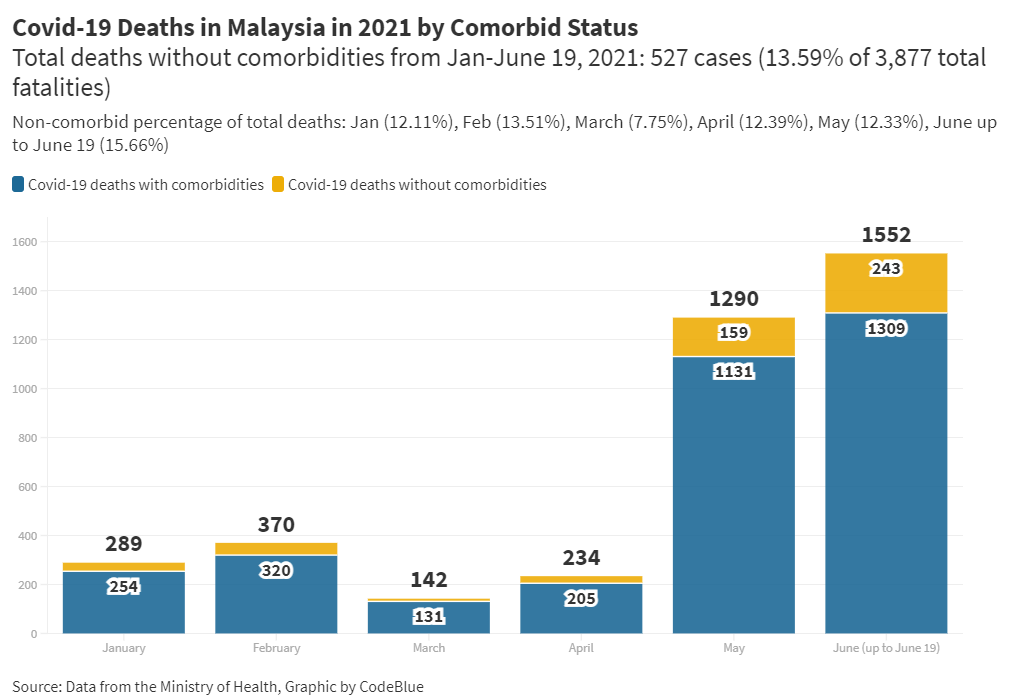KUALA LUMPUR, June 24 – About 13.59 per cent, or 527 of 3,877 people who succumbed to Covid-19 this year up to June 19, did not have underlying medical conditions.
On average, of a 100 people who died from Covid-19 this year, 14 did not have reported or diagnosed comorbidities.
The Covid-19 fatalities considered in this analysis as not having underlying health issues included patients that were declared to have had no or undiagnosed comorbidities during the time of death and also patients with standalone mental health or nerve-related issues.
June saw the highest number of patients dying without comorbidities at 15.66 per cent, or 243 of 1,552 Covid-19 fatalities reported this month up to June 19.
There has been a gradual increase of Covid-19 fatalities without comorbidities since January this year, except for a drop in March. Last month, 159 people died from Covid-19 without reported underlying health issues, comprising 12.33 per cent of 1,290 fatalities in May.
The month of May and the first 19 days of June saw a steep increase in coronavirus-related deaths in Malaysia at 1,290 and 1,552 fatalities respectively, compared to fewer than 400 deaths in each of the previous months this year.
From the 527 people who died without comorbidities, nearly 85 per cent of them were Malaysians and 15 per cent were migrants.
The most worrying fact was that 27.7 per cent, or 146 of the 527 who died without comorbidities, were brought-in-dead (BID), meaning they perished before they were able to seek medical treatment.
On common areas for Covid-19 deaths without underlying health conditions, the highest was in Labuan at 261.04 per million population, followed by Kuala Lumpur (43.41), Melaka (25.62), Selangor (24.51), and Negeri Sembilan (20.25), followed by the rest of the states. The lowest were Perak (4.76), followed by Perlis and Putrajaya that recorded zero fatalities without underlying health conditions.
This can be interpreted in two ways: the states with higher Covid-19 deaths without comorbidities are either very good in picking up non-communicable diseases, or there is a number of variants of concern (VOC) spreading in the community.
From a paper published in the British Medical Journal (BMJ) two months ago, it was reported that Brazil hospitals were seeing an increased number of Covid-19 infections among the younger age group, possibly related to increasing mortality rates among young people. Thus, VOC may lead to higher fatalities because of higher infection rates.
The highest proportion of Covid-19 deaths without comorbidities was among those aged 15 to 24 at 30.77 per cent, or four of 13 total fatalities in that age group. This was followed by the 24-44 age group (25.49 per cent) and 45-54 age group (22.22 per cent).
Far higher numbers of Covid-19 fatalities without underlying health conditions, however, were recorded in older people at 103 and 244 deaths in the 55-64 and 65-and-above age group respectively.
The highest proportion of people brought in dead from Covid-19 without any underlying health conditions was reported in the 15 to 24 age group at 15.38 per cent, or two of 13 total deaths in that age group. This was followed by the 25-44 age group (9.8 per cent), followed by the 45-54 age group (9.3 per cent).
However, in terms of absolute figures, the highest number of BID deaths without comorbidities was recorded among people aged 65 years and above at 52 fatalities, followed by the 45-54 age group (41 deaths), and 25-44 age group (30 deaths).
The increase in the number of those dying from Covid-19 without comorbidities from younger age groups is a growing concern. Although many victims are still largely the elderly, but with the introduction of VOC in the community, this might change if vaccination is not ramped up quickly. We have to step up before the virus steps on us.
CodeBlue is keeping the author anonymous because of the government’s gag order on civil servants. This article was edited by Boo Su-Lyn.








